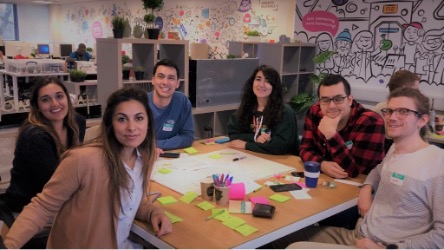
Dr Fouzia Haneef Khan, Teaching Fellow on the MSc Genes, Drugs and Stem Cells – Novel Therapies programme, outlines her recommendations to create an effective partnership as mentor and mentee.
Over the past seven years, I have had a variety of teaching experiences, some excellent, some awful, and some in between. Thinking about the start of my teaching journey, I remembered feeling slightly unconfident when delivering a teaching session, with a sense of doubt about whether I was reaching my potential to give the best learning experience to students. However, with the help of more experienced colleagues, I feel that I have significantly improved in these areas. These mentors have supported me on my journey by giving specific and useful recommendations about teaching strategies and general career advice.
The most important aspect of this relationship to me is that I know that I can rely on someone who is experienced in the field and has gone through similar challenges as I have. Underlying this mutual respect and trust is a feeling of genuine friendship.
Experiences as both mentee and mentor
In addition to being a teaching fellow, I am also completing an MEd in University Learning and Teaching (ULT). I also hold a Fellowship of the Higher Education Academy (HEA). Throughout my educational journey, I have been fortunate to learn a great deal from my mentors who have supported me to develop professionally in my teaching career. They helped me to evaluate my teaching practices and advised me on innovative teaching designs. I have learned how to receive constructive feedback, which has helped me to challenge myself, grow, and improve. One of the best advices my mentor gave was to gain more visibility by participating in educational conferences. Since then, I have been actively involved in both internal (Imperial Education Conferences) and external conferences to further my professional development as well as network with colleagues who have similar interests. Ultimately, all this has allowed me to better contribute to students’ learning.
As a mentee, I was able to recognise the qualities that make a good mentor, and I have aimed to emulate these in my current position as Teaching Fellow. It is incredibly satisfying and an honour to give advice to other teaching fellows in various stages of their careers, even if this is done in an informal environment. My most recent mentoring experience was helping Graduate Teaching Assistants working on the programme to navigate their way through the application process for the Associate Fellow of the HEA. To become an effective mentor, I have strived to build a positive relationship by trying to appreciate the specific individual needs and progress of my mentee. For me, the key to this has been to be always available for open dialogue, and the commitment to give clear and honest feedback. My mentoring experience has also helped me improve; it has made me more self-aware and has driven me to continue to develop in the workplace.
Having experienced both as a mentor and a mentee, below are my recommendations to create an effective partnership:
Mentee:
- Identify mentors
- Be productive and persistent in developing relationship with your mentor
- Set clear expectations
- Set clear career goals
Mentor:
- Make time to listen to your mentee
- Set regular meetings and build a relationship with your mentee
- Build trust and share your journey
- Promote your mentee and provide networking opportunities to help them grow
- Celebrate your mentee’s achievements
Mentoring has been an enlightening experience for me. It is a great privilege to help talented colleagues in their professional development, and it has helped to reflect on my teaching practice and develop my mentoring skills along the way. I would wholeheartedly encourage any staff inspired by their own mentors, to develop similar relationships with others.

Dr Fouzia Haneef Khan is a Teaching Fellow on the MSc Genes, Drugs and Stem Cells – Novel Therapies programme at the National Heart and Lung Institute.